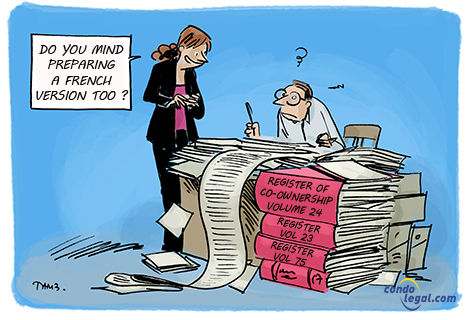 In co-ownership law, unanimity is a rule that requires the agreement of all co-owners, not just those present or represented at the meeting of co-owners. To adopt a unanimous decision, it requires the favourable opinion of all the co-owners, no votes against, and no abstentions. Unanimity is the highest level of consensus and, therefore, the most difficult to achieve. This unanimity requirement only applies to certain co-ownerships. In addition, it is important to note that the law provides individual protection to co-owners with respect to their right of ownership over the common portions of the building and the change in the destination of their private portion.
In co-ownership law, unanimity is a rule that requires the agreement of all co-owners, not just those present or represented at the meeting of co-owners. To adopt a unanimous decision, it requires the favourable opinion of all the co-owners, no votes against, and no abstentions. Unanimity is the highest level of consensus and, therefore, the most difficult to achieve. This unanimity requirement only applies to certain co-ownerships. In addition, it is important to note that the law provides individual protection to co-owners with respect to their right of ownership over the common portions of the building and the change in the destination of their private portion.
Declarations of co-ownership prior to January 1, 1994
Some declarations of co-ownership registered before January 1, 1994 contain a stipulation that states that "All decisions to change the use of the building shall be taken unanimously." However, section 53 of the Act respecting the implementation of the reform of the Civil Code states the following: when a declaration of co-ownership (published before January 1, 1994) establishes the unanimity rule for any decision to change the destination of the immovable, this rule is maintained, despite article 1101 of the Civil Code of Quebec. This means that, despite the changes made to the Civil Code of Québec, in article 1098(1), the rules established before 1994 continue to apply where the declaration specifically provides for it. In short, the Act respecting the implementation of the reform of the Civil Code protects the rights of co-owners by requiring their consent for any decision that aims to change the use of the immovable.
Individual Consent
Article 1102 of the Civil Code of Québec protects the rights of co-owners by stipulating that the meeting may not pass a resolution that would change the relative value of a co-owner's fraction or the destination of his or her private portion without his or her consent. This consent can be expressed by a favourable vote of the co-owner concerned or by the latter's intervention in the notarial deed to modify the declaration of co-ownership.
It is important to note that the majority is not in question here. The consent of the affected co-owner is required, regardless of the majority of votes. This underscores the importance attached, in this specific case, to the individual rights of co-owners in the Civil Code of Québec.
 WHAT YOU SHOULD KNOW ! Article 1102 of the Civil Code of Québec,establishes a legal framework for the protection of the rights of co-owners. It stipulates that "any decision of the syndicate which, contrary to the declaration of co-ownership, imposes on the co-owner a change in the relative value of his fraction or the destination of his private portion" is "ineffective". Thus, any resolution to change the relative value of a co-owner's fraction or the destination of its private portion cannot be adopted without the latter's consent.
WHAT YOU SHOULD KNOW ! Article 1102 of the Civil Code of Québec,establishes a legal framework for the protection of the rights of co-owners. It stipulates that "any decision of the syndicate which, contrary to the declaration of co-ownership, imposes on the co-owner a change in the relative value of his fraction or the destination of his private portion" is "ineffective". Thus, any resolution to change the relative value of a co-owner's fraction or the destination of its private portion cannot be adopted without the latter's consent.
 WHAT TO KEEP IN MIND: Some declarations of co-ownership prior to January 1, 1994 require a unanimous vote for decisions to change the use of the building. According to article 53 of the Act respecting the implementation of the reform of the Civil Code this requirement of unanimity remains by way of exception, despite article 1098 of the Civil Code of Quebec.
WHAT TO KEEP IN MIND: Some declarations of co-ownership prior to January 1, 1994 require a unanimous vote for decisions to change the use of the building. According to article 53 of the Act respecting the implementation of the reform of the Civil Code this requirement of unanimity remains by way of exception, despite article 1098 of the Civil Code of Quebec.
 WARNING! When it comes to unanimity, absenteeism at a meeting of co-owners blocks votes and prevents changes in the co-ownership. A single absent co-owner can block the adoption of certain resolutions requiring unanimity.
WARNING! When it comes to unanimity, absenteeism at a meeting of co-owners blocks votes and prevents changes in the co-ownership. A single absent co-owner can block the adoption of certain resolutions requiring unanimity.
Return to the super-factsheet ''Majorities required in Meeting ''


